Realities of Running an English News Portal in Croatia in the Corona Era
March 24, 2020 - Running an English-language news portal in Croatia is a challenge at the best of times, but these are far from the best of times. A look behind the scenes at TCN in the corona era.
These are extraordinary times in Croatia, and today's snow over much of the country after a winter with almost no snow was the latest confirmation - to me at least - that Croatia really was the global leader in unpredictability.
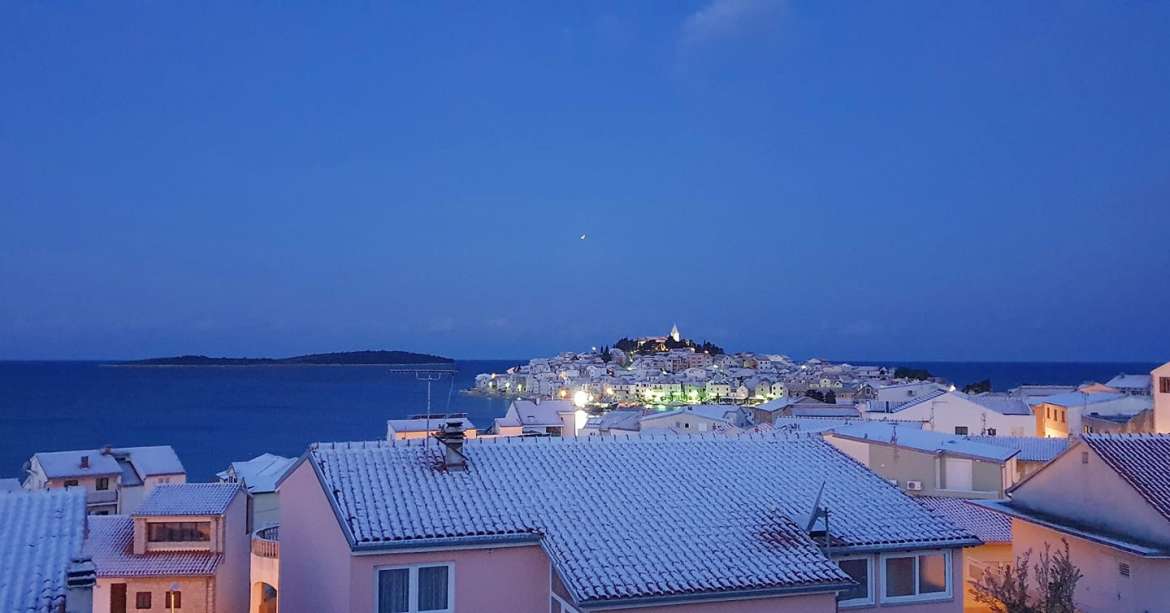
(Spring in Primosten - Photo by Sime Saric)
And nothing was more surreal than on Sunday, when my phone starting ringing at 06:25, my WhatsApp and Messenger ablaze with the very same message so early in the day:
Earthquake.
The shocking news was yet to sink in of the quakes that shook the Croatian capital, but now it was time to work. Our first report of the Zagreb earthquake was published at 06:39, just 15 minutes after the first earthquake struck. It was the first to hit the Internet in English and be indexed by Google News.
It was obviously not quite the start to the day I had planned. The early morning calls did not wake me, for I was already at my laptop working on the first article on the topic that would surely dominate the Croatian news that day - coronavirus.
I was wrong.
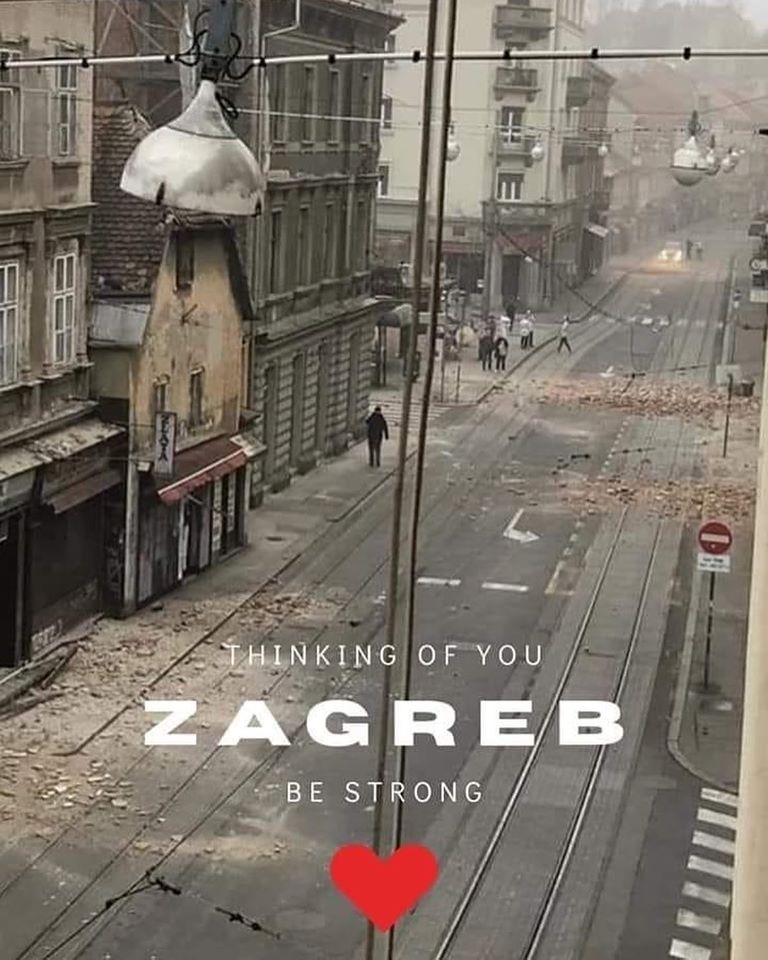
I was chained to the laptop all day, trying to cover as much as I could myself while marshalling the rest of the TCN team. A team that was a little slimmer than last week, as the reality of the corona effect on all of our lives economically reared its ugly head in the form of client cancellations, which sadly has resulted in staff cutbacks at TCN. A temporary measure, we hope. But in this crazy uncertainty, hope is all we have.
The earthquake was not kind to our Zagreb team.

(Photo credit Forrest Stilin)
TCN's Forrest Stilin had arguably one of the most harrowing starts to the day of people in Zagreb - the double whammy of a 06:24 earthquake with a magnitude of 5.5 combined with the bedroom chandelier landing on his bed. Fortunately, Forrest has trained himself for such eventualities over the years and always sleeps in the middle of the bed. A fortunate escape. Drzi se, Forrest! We hope you are doing ok.
Forrest remains without Internet or gas some three days later, as well as a rather claustrophobic feeling of confinement with the new reality. Without Internet, he is unable to wrote for TCN, of course, but that is the least of our worries. We look forward to having him back online after recovering from the stress of this ordeal.
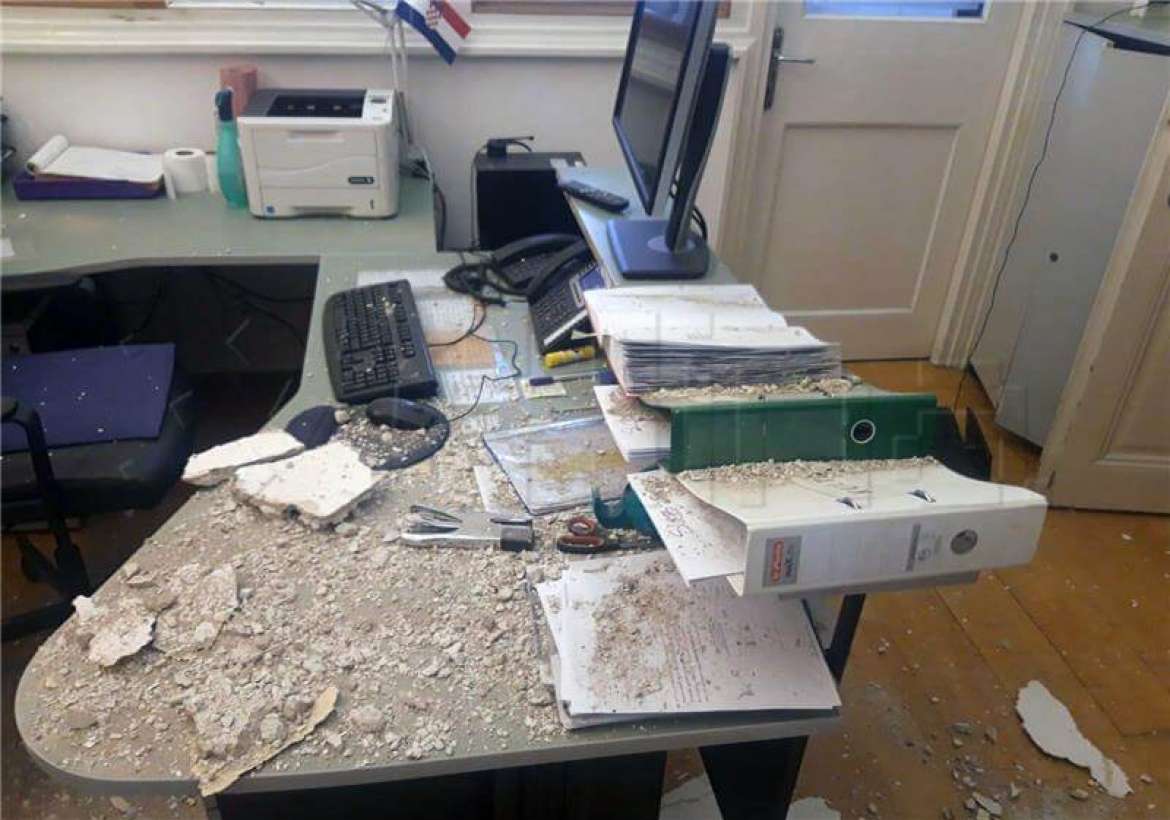
Forrest was not the only TCN victim of the earthquake. The State media service, HINA, with whom TCN has been cooperating for a couple of years, had its building severely damaged (the photo above is from the HINA Twitter feed) - you can read more about it here. But despite the considerable inconvenience, HINA soldiered on at a time when its readers and subscribers needed it most. Bravo!
TCN's beloved editor, Lauren Simmonds, was also caught up in the earthquake, although she suffered more damage the following day with the 3.7 magnitude earthquake which came 11:12 on Monday. It felt strong, said Lauren, and we were live with the story three minutes later. I asked Lauren to send me something that reflected her reality for this story.
The once busy view from her apartment - a lone fire engine cleaning up after the earthquake.
Sunday was easily the most intense day in TCN history (as well as the second busiest, with more than twice as much traffic as the World Cup Final on July 15, 2018). There were huge coronavirus stories and new travel restrictions to report on as well, and just when I was about to call it a night...
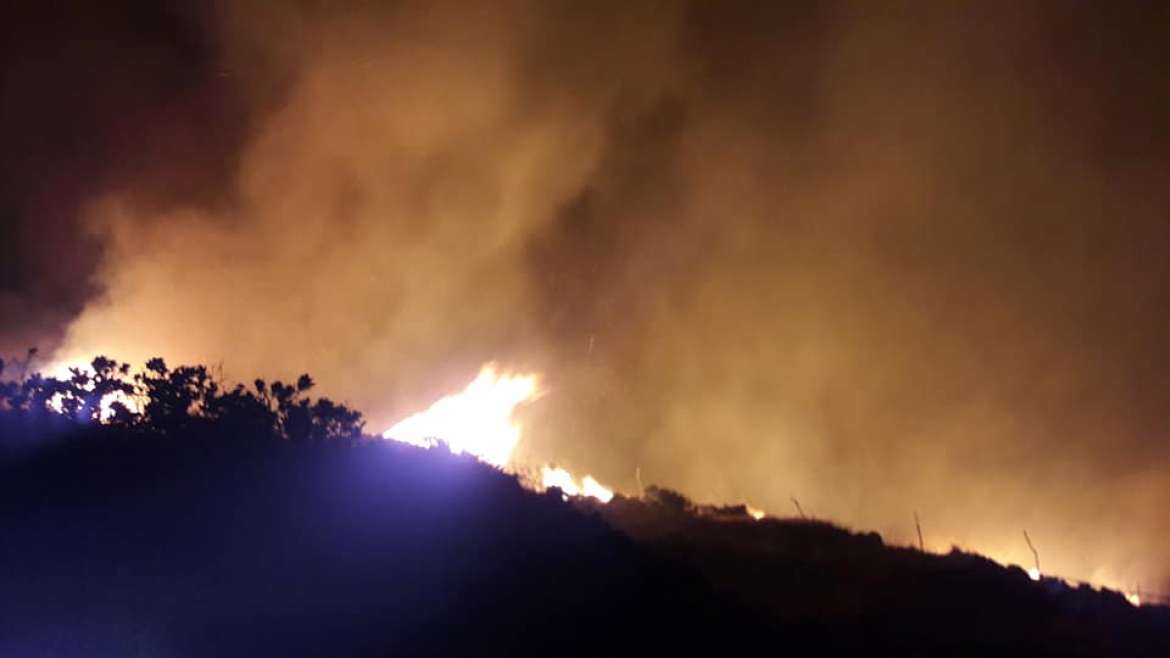
This.
A large fire had broken out on the south side of the island of Hvar, between Zavala and Ivan Dolac, with some 40 firefighters and 12 fire engines battling the blaze. We were live minutes later, with a morning update that the fire had been brought under control around 01:00.
And where was I, reporting on all this madness around me?
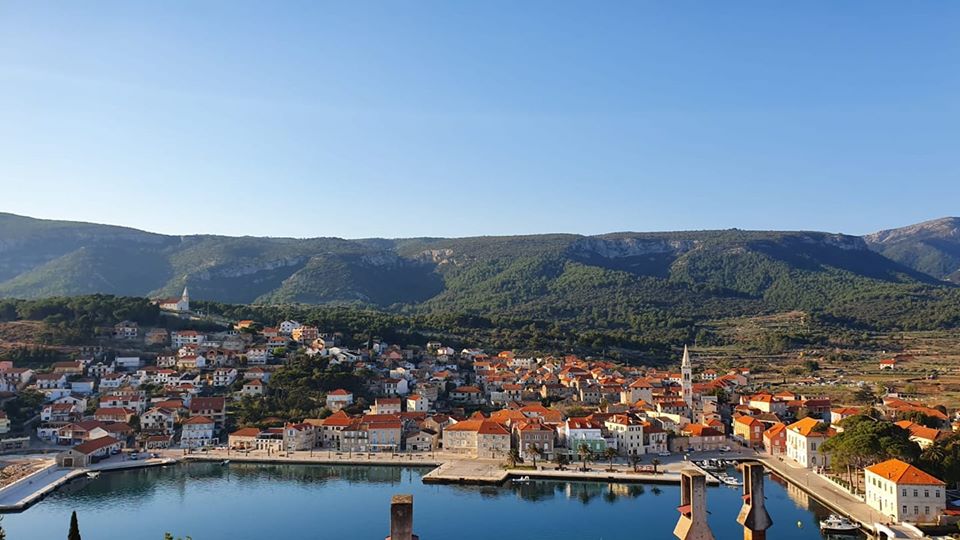
For the most part, lying in bed, self-isolating in our home in Jelsa, with sunshine beaming through the windows, a tranquil scene below. The first corona case had been reported a few kilometres away just days before, but this was a haven compared to the madness around, and it felt all the more surreal while reporting on all the chaos around.
There are pros and cons of self-isolating on an island rather than the mainland, as I explored in The Realties of Self-Isolating on Hvar, Croatia's Premier Island.
But that view, and the feeling of relative safety, nature, and plenty of space with a very supportive family, are some very big positives.
Things are tough all round at the moment, and everyone is dealing with their own corona hardships.
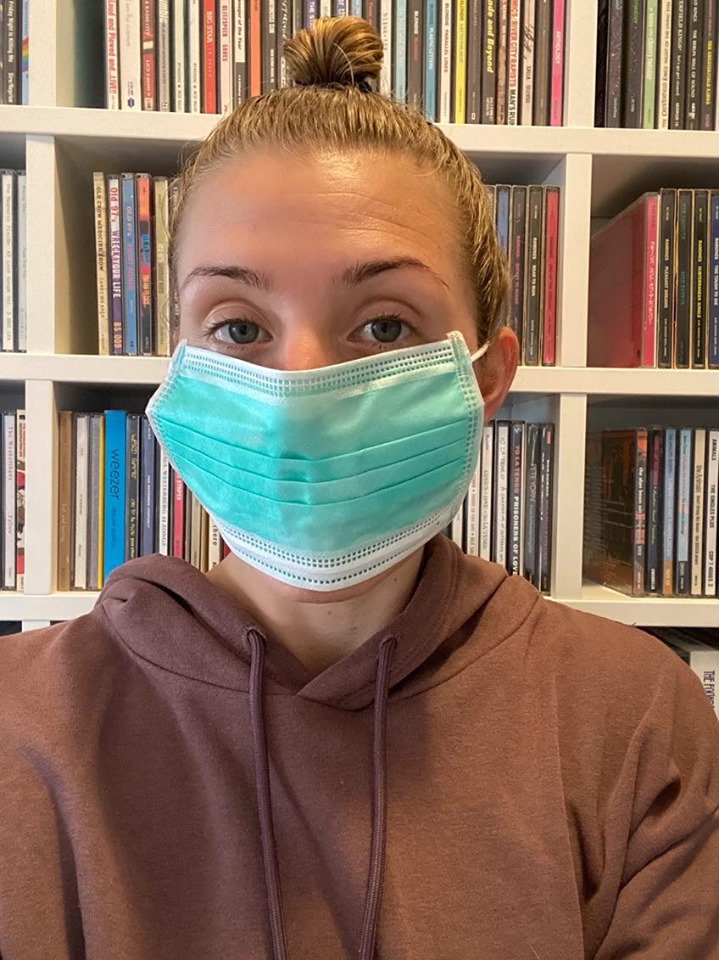
Dani has been with TCN for almost four years now, and she has done a magnificent job for us, covering so many topics for us that we have both lost count. And she has risen to the challenge once again, putting her personal difficulties to one side to perform above and beyond the call of duty.
The funny thing is that although Lauren, Dani and I have been the core of TCN for almost four years, we have only physically been together all three of us at the annual TCN Xmas party and one other occasion. And yet despite that, I have probably the best working relationship and team spirit of my life with these two magnificent ladies, who are both superb in times of crisis. Only my time working with outstanding colleagues in the wake of the Rwanda genocide in 1994 comes close.
Thank you ladies, you are both beyond fabulous, and thank you for all you do (and I know I speak for many others when I say that). Someone from New York messaged me recently to thank us for our work and was surprised at how few people worked on TCN and our Slovenian and Montenegrin portals.
"I thought you had about 50 people," the New Yorker said. With colleagues such as Dani and Lauren, it can seem that way I guess. The last three days has made our bond all the stronger.
Here is Dani, mask on in Split, and currently living with parents and grandmother. As the only under-65 in the household, her responsibilities go beyond just writing for TCN.
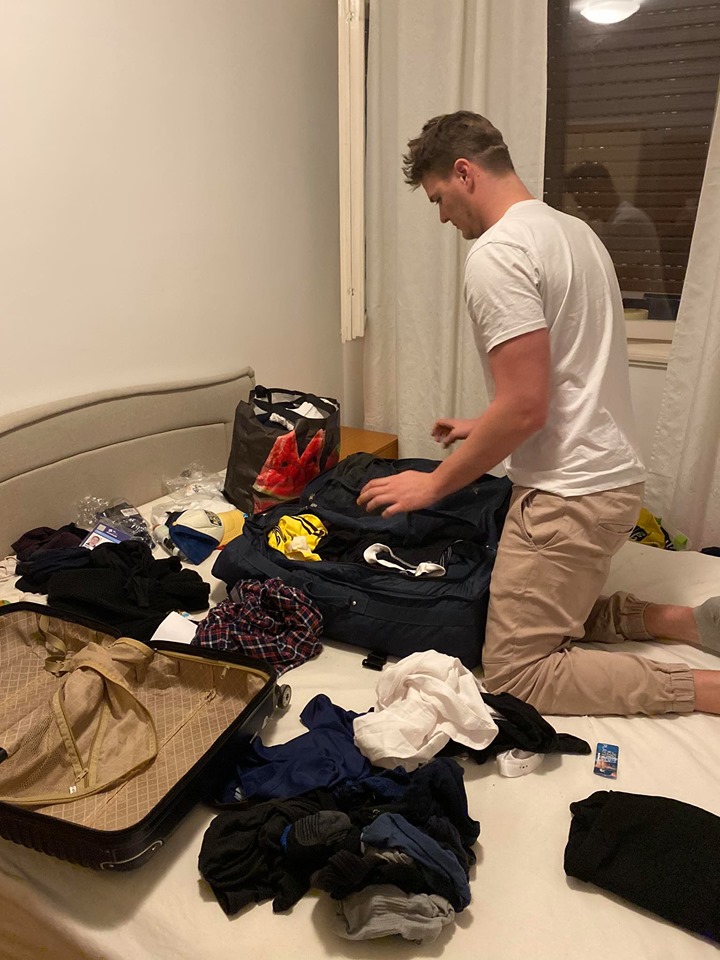
She too, is facing other new realities, as boyfriend Nathan, part of the Australian waterpolo team, was then told to return to Australia by his coach for Olympics training before Europe locked down. After much stress and packing up his apartment until 04:30, he took the first Splt flight to Zagreb on the day the EU flight ban came into effect at midday, not knowing if he would be able to fly at 14:00. More stress, but he made it, and was welcomed home to Australia and a mandatory 14-day self-isolation and an uncertain future.
To prepare for an Olympics which will not take place this year.

Other occasional TCN contributors were living their own self-isolation realities - here is intern Janja, who is already well-versed in the art of self-sufficiency in her village near Varazdin. She also found time to write about the experiences of those communities who were at the very epicentre of the earthquake, communities which have been largely ignored with all the focus on Zagreb.
Self-isolation means no socialising with anyone, and a lonely walk for an hour each evening when there is nobody around. A tour of the Jelsa riva the day after all the cafes and restaurants closed.
And what of the reporting itself?
I started Total Hvar almost nine years ago, a happy tourism blog about the idyllic island of Hvar. I am not quite sure how that got transformed to three Google News websites for Croatia, Montenegro and Slovenia, but here we are. Since starting TCN, I have come to learn how many people (expats here, parts of the non-Croatian-speaking diaspora, and tourists with a love of Croatia) depend on TCN for their news and updates about Croatia in English. And this has never been more true than the current moment, when there is so much fear, uncertainty and fake news around.
I talked to the core team and we agreed that we had a social responsibility to report as much as we could, as accurately as we could, and in as detailed a manner as we could. We would not get it right every time - how could we, confined to our homes in different parts of the country - but we would give our best. The Croatian online community is a brutal audience at the best of times, and we long ago established that a foreigner has no right to an opinion here. I actually quite enjoy the levels of abuse I receive these days, and I reward the best of them with a guest appearance on my Troll Friday series on my Facebook page.
But with opinions divided, stress levels high, and emotions all over the place, would it be possible to navigate the waters of an audience of Croatian keyboard warriors?
(My only social life these days - my daily Tinder date with the bura - a welcome escape from the stress, if only for an hour)
In order to encourage some better behaviour from our commentators, I decided to post a request on the TCN Facebook page for people to think before they commented in these stressful and emotional times. I have only banned 28 people in 9 years of the Total Project, mostly for hate speech of the ultimate crime of being highly irritating. Just as reading TCN is not compulsory, so too reading some of the horseshit that passes as comment. I announced that we would be taking a more proactive approach to ban aggressive, abusive and irritating posters. A policy, I am pleased - and rather surprised - seems to have worked. Only two people banned so far with the new regime.
Of course, we don't get it right every time - how could we, confined to our homes? And it has been instructive to observe how quickly some people jump down our throats to accuse us of fake news and sensationalism. Reporting for example, on the death of a 15-year-old girl in the earthquake as the Croatian media did, only to then learn that she had been resuscitated (she has since sadly passed away). Or reporting that earthquake that Lauren said was strong the following day to be accused of stoking up an already emotive situation in the name of clicks, when it was merely an aftershock.
Suffice to say that the coronavirus has taught us all a LOT about each other, and I for one have learned who I do - and who I do not - want to know on the other side. And some of those don'ts have really surprised me.
Our job has been made a lot easier by the superb support we have around us. First and foremost, to the whole team at Index.hr, whose timely reporting, live updates, and great map and stats, have been easily the best source of information from day one, a time when others were dismissing the pandemic.
A big shout out to all the officials coordinating the crisis response, both in terms of steps made and communication to the population. I hope both Vili Beros and Alemka Markotic get their own statues on Ban Jelacic Square when all this is over.
And to the various contributors to TCN, who have helped take some of the load. We are thrilled to have Igor Rudan on our team, whose authoritative scientific texts have become required reading far beyond Croatia's borders. Here is his latest.
Other great contributions this week include Aco Momcilovic for the Voice of the Entrepreneur, Ivica Profaca's Diary of a Split Tour Guide in the Age of Corona, and Zoran Pejovic with some positive advice for those in the tourism industry.
Thank you all, and we welcome quality contributions at all times - please contact me on This email address is being protected from spambots. You need JavaScript enabled to view it. if you are interested.
And that, as they say, is that. The only other thing to add is that the 8 bottles of gin in the lead photo are sadly empty, and have been since the summer of 2014.
We thank you for all your support in these difficult times. We will not get it right every time, but we are doing our best to play our little part in helping us all get through this crisis.
And I leave you with the most important advice of all, especially if you are in Dalmatia.
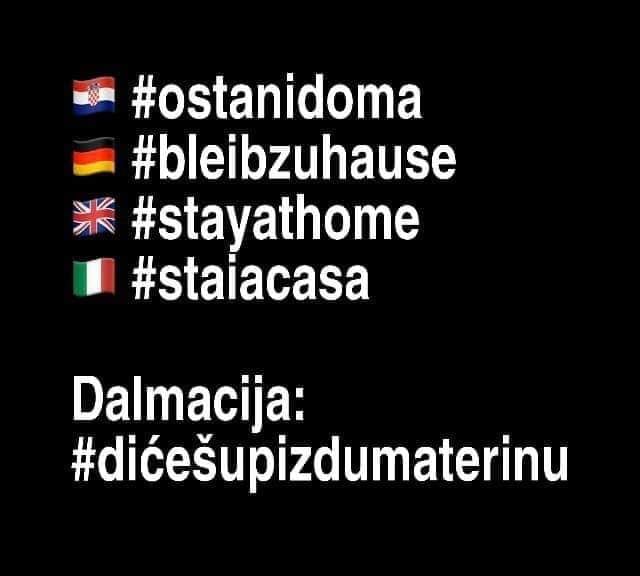
Overview of Coronavirus Measures, What's Open, What's Closed?
March the 24th, 2020 - Despite the endless articles about coronavirus in Croatia as the situation begins to escalate and the country introduces more strict measures, many are still being left somewhat confused by statements that have been a little vague in some cases.
Let's take a look at the measures now in force in Croatia in an attempt to stop the spread of COVID-19.
Entering Croatia:
You must be able to demonstrate that you have an address and legal residence in Croatia in order to enter.
Social distancing:
Social distancing has been required for a while now. While initially fairly liberal in its nature, it asks that people don't gather in groups of more than five, and that a distance of one metre or more is kept between each person. Since people failed to respect this request initially, stricter measures are now in force. Unless you are going home, to the shop, to the pharmacy, or to and from work if there is no way for you to work from home (this applies mainly to key workers and those in healthcare), you should remain indoors.
Hanging around, gathering or staying out on the street is prohibited and the police can fine you for doing so.
How should I behave in pharmacies?
At the entrance to pharmacies, new measures are in place to avoid any crowding.
One staff member will serve one person and there will be no lines and waiting. After that person is dealt with, then another person can enter the pharmacy. It is an absolute must that you keep a distance of at least one metre between each other when waiting to enter the pharmacy.
It is mandatory to keep a distance of at least 1.5 metres between you and the staff member when speaking to them.
When buying disinfectants, masks and medicines, keep in mind that sales are limited and try to avoid selfishly purchasing more than you need.
Use a card payment method, preferably. Money is dirty at the best of times.
If you cough and sneeze, make sure to cover your mouth and nose and if possible, do so with a piece of tissue paper, which you then discard into a waste bin with a lid outside the pharmacy and wash your hands.
When coughing and sneezing, turn your face away from other people.
If you have respiratory issues (such as coughing, sneezing, a sore throat, a fever, or shortness of breath) please do not go to the pharmacy yourself. Instead, call your doctor or call 112.
How should I behave in stores?
All stores and their manufacturers have enough goods in stock and you won't run out of what you need, so please don't go into a panic buying frenzy and forget about the needs of other people. Empty shelves in stores are mainly a result of the fact that it's impossible to fill them fast enough, and not because products are lacking in actual supply. This happens in cases where a large number of customers are looking for the same product and there is no big conspiracy behind it. Give the staff a chance.
When shopping, you need to keep a sufficient distance between yourself and other customers, especially when paying. Try to avoid going to the store in times when there are typically more people wanting to shop.
Wash your hands thoroughly before going and especially after leaving the store. Washing your hands regularly is the most important protection for you and others against COVID-19.
Thoroughly wash the fruits and vegetables you've purchased and are going to directly consume.
Try your best to not touch your mouth, eyes or nose while shopping and avoid contact with other customers.
If you are over 65 years od age, do not go to the store yourself. Ask your neighbours, relatives, friends or acquaintances to do your shopping for you.
Try to forget all about cash for the time being and pretend it doesn't exist. Instead, get into the habit of making card payments. Don't hand your debit or credit cards over to the merchants but lean them on the POS devices yourself. If you need to sign, bring your own ballpoint pen and don't rely on the ones the shop has. Something as simple as that can help to prevent coronavirus' potential spread.
Don't get into panic mode. The supply in stores is currently functioning normally, even in countries where the number of infected people is extremely high. Don't let panic overwhelm you and push you into selfishly endangering your own health or that of other people.
What is open and what is closed? What's the current regime?
According to Slobodna Dalmacija, grocery stores have adjusted their working hours since the introduction of new measures and now operate from 08:00 to 17:00. This includes those selling hygienic supplies.
Pharmacies are open until 17:00.
Markets are no longer in operation at all.
Fuel stations operate on a regular basis.
Stores which don't sell food and medicine are currently closed complerely, but many do still deliver, so make sure to check on their respective websites.
Pubs, cafes, bars and fast food restaurants and establishments are no longer open, but an increasing number of restaurants and other establishments are still delivering as normal. It is important that food providers, as well as those who prepare these foods, follow strict hygiene instructions so as to limit the possible spread of coronavirus as much as possible. Persons doing deliveries should also have disinfectant sprays with them.
Veterinary clinics/animal hospitals and pharmacies are working normall. However, it is advised that you don't take your pet to the vet unless it is an emergency and the animal needs medical attention.
Dentists working in private practices have notified their patients that they're no longer working, while others have introduced emergency services for those who require urgent treatment. All patients who have a scheduled appointment will be notified of the delay and be given instructions on what to do/who to contact should they need care.
Measures for transport and travel:
Public transport is no longer operational and will remain so for the foreseen duration of these stricter measures (currently thirty days, but this can be shortened or extended). At the moment, taxi services are running normally.
As of yesterday, a ban on leaving your city/town/municipality of registered permanent residence has been in force. This means that you cannot leave the place in which your permanent residence is registered for the time being. Click here for more details and a full translation of the official decision.
How are the police overseeing this?
The police are present on the streets and will ask people to move on if they are hanging around or are in groups. There are also large fines.
Since the decision adopted yesterday stating that people can no longer leave their place of registered permanent residence, police officers will monitor its implementation and make sure it is carried out correctly.
The police confirmed to Slobodna Dalmacija that their staff would be located on frequently roads and at the entrances to the City of Split. Only emergency service vehicles will be allowed to pass through without issue.
''In order to prevent the spread of coronavirus together, daily migrations must be kept to a minimum, which means consistent adherence to the decision, which makes it the responsibility of citizens to respect the ban, and to only leave their place of permanent residence exclusively if they have a pass/permit that was issued to them by the competent authority,'' said the police.
Citizens who are excluded from the prohibition in question are required to show to police officers supervising the implementation of the decision a certificate/pass/permit issued by the competent authority.
What are these passes/permits, how do I get one?
The Civil Protection Headquarters issued the decision mentioned above. It prohibits any unnecessary long-distance movement, while for other movements, it's necessary to perform the appropriate procedure in the form of obtaining a pass.
Details on who can be granted a pass are listed in our full translation of the decision and the measures it implies.
Persons requiring urgent medical care will be issued a pass by an elected family physician (GP), those who provide care for children and the elderly will be issued a pass by the competent civil protection staff, while all other passes are issued by, for example, an employer.
The Government published instructions for carers and e-mail addresses to which citizens should send their requests, depending on the county in which they're located. If you need to go to the headquarters in person, you need to employ all of the other measures now in place, such as social distancing.
The request must include a detailed explanation of the needs of the person or persons you are caring for. The e-mail addresses of the competent Civil Protection Headquarters by county are listed below.
Make sure to follow our dedicated section for all you need to know about coronavirus in Croatia.
Croatian Interior Minister Warns Parents Against Taking Kids Out in Snow
Croatian Interior Minister Davor Bozinovic has a few words to say about Croatia's snowfall.
If the coronavirus pandemic and ever stricter measures wasn't enough, an earthquake or two helped to convince people even more that some sort of Biblical scenario was playing out. If they needed another kick in the teeth, however, Zagreb and many other places across Croatia woke up to freezing temperatures and snow this morning, too.
With all of the anti-epidemic measures now fully in place, Croatian Interior Minister Davor Bozinovic made sure to warn parents not to see the usually pleasant sight of snowfall as an excuse to take the kids out and build snowmen or have snowball fights. White stuff or no white stuff, all of the previously introduced measures against the spread of coronavirus are still in full force.
As Poslovni Dnevnik writes on the 24th of March, 2020, Croatian Interior Minister Davor Bozinovic warned parents to cast aside any thoughts of using this cold and snowy day to get the kids out of the house for some air. If they do that, the authorities will send them home, he said.
The Croatian Interior Minister and the Civil Protection Headquarters made sure to let parents know that the police would be watching despite the snow, and that children and everyone else must remain indoors.
''This is not the time to be going out and having fun in the snow. I'd like to ask parents and anyone who thinks of this snow day being a reason to go out and have fun and leisure, to give up on that idea immediately. The competent institutions will prevent them from doing that and will send them home,'' Bozinovic warned during a press conference at the Civil Protection Headquarters.
Bozinovic also used the opportunity to appealed to traders and others not to advertise discounts and actions for products that are not necessary in these types of situations, because this is not the appropriate time to do so.
Make sure to follow our dedicated section for all you need to know about coronavirus in Croatia.
Unequal Treatment of Truck Drivers Will Lead to Collapse of Supply
ZAGREB, March 24, 2020 - The Croatian Chamber of Commerce (HGK) road hauliers' association warned on Monday that the uneven treatment of foreign and domestic hauliers in implementing measures against the spread of coronavirus would result in the collapse of supply.
"According to information from the ground, more than 60% of domestic hauliers are either in self-isolation or quarantine, which puts an enormous strain on our companies. If transport collapses, the shelves in the shops will remain empty and the consequences will soon be felt by the entire economic sector," HGK vice-president Mirjana Čagalj said.
Road hauliers say that when driving and loading or unloading their trucks, drivers do not come into contact with other people, which is why they should be enabled to self-isolate at home, under epidemiological observation, and that they should be allowed to work as long as they do not have any symptoms.
More coronavirus news can be found in the Business section.
Igor Rudan: Why We All MUST Stay Home for At Least One Month
As Igor Rudan/Vecernji list writes on the 23rd of March, 2020, if we don't go into quarantine, our healthcare professionals will not have to worry about a few dozen or several hundred people who are suffering from coronavirus more severely, which our system can handle, but several thousand of them, which it can't. All of those differences are now our responsibility.
I have joined forces again with our renowned mathematician, Toni Milun, to explain through this text and the accompanying video why we now all have to stay in our homes for at least a month and strictly adhere to the quarantine guidelines.
Pandemics, like the world wars, are dynamic events with an uncertain outcome. In these times, things can quickly change from stage to stage. When encountering a new, unknown and invisible opponent such as this coronavirus, surprises are always possible. That's why one should be careful, but one shouldn't panic. Only those with ''cold'' heads can make all of the important moves and respond to challenges at the right time, based on reliance on science and proven information.
On the one hand, the virus can always surprise us with its mutation. Random mutations of its genetic instructions can change the severity of the symptoms it will cause when causing an infection. They can also change the rate of its spread among the population. On the other hand, there are several lines of defense at our disposal that, depending on the behaviour of the virus, can be activated at the right time. Compared to the situation only three weeks ago, today, I have to make it clear that the epidemiology profession has significantly changed its perception of the danger of this new coronavirus.
By constantly collecting information from many countries, we now have a better understanding of the way it threatens us. I will try to explain here why the attitude of the profession has changed and why everyone now really MUST stay disciplined in their homes for at least a month.
I've written before that this is already the seventh coronavirus to try to adapt to the human species. The first four cause common colds and have been harmless to humans. The fifth, the SARS epidemic, however, was terribly dangerous. It killed as many as 10 percent of the people it infected. It expanded in 2002 from the Chinese province of Guangdong to more than 25 other countries, but was stopped everywhere on the front line(s) of defense.
The sixth one, the MERS epidemic, was even more dangerous. That killed as many as a third of those infected. It spread from Saudi Arabia to more than 25 other countries. But even then, it was stopped by the front lines of defense. These lines of defense include the isolation of patients and all of their contacts. When the epidemic of the seventh coronavirus, with COVID-19 as its causative agent, erupted in Wuhan in January 2020, it isn't surprising that the epidemiologists' interest was primarily focused on the death rate among those infected.
The reason is that previous death rates for SARS and MERS were so terribly high - 10 percent and 35 percent, respectively.
It was soon realised that the death rate among the most severe cases and hospital patients in Wuhan was about 5-10 percent when it came to this new coronavirus. However, it was only valid for the most severe cases that came to the hospital there, but not for anyone infected in the community. Infected doctors, like most patients in the population, had significantly milder issues. Therefore, it was necessary to determine as soon as possible the rate of death among those infected.
We got our first idea of the actual death rate of infected people when the work of Z. Wu and J.M. McGoogan was published in JAMA back at the end of February. It was based on a major report by the Chinese Centre for Disease Control, based on 44,672 COVID-19 positive patients in all Chinese provinces.
The authors showed that the death rate in the Hubei province was 2.9 percent, but they knew it was unrealistically high. This is because, at the earliest stage of the epidemic, the overwhelmingly severe cases that came to hospitals were tested, and there was no time at the height of the epidemic to test many in the community. A much more realistic estimate, therefore, was among those who tested positive outside the province of Hubei, on the front lines of defense of all other Chinese provinces. This death rate was 0.4 percent.
This means that for every 200 people with COVID-19, if given adequate medical care, only one person would die, or even less than that. Confirmation of that came from South Korea, where an unusual incident occurred. A community epidemic happened there, behind the front lines of defense. The authorities there went forward with en masse testing. Thus, the path of the virus among the population was constantly monitored and all the infected were isolated.
For such a very deep first line of defense, South Korea also had enough money, experience and all the other necessary facilities. 10,000 people were tested daily. Based on the first 140,000 tests, the rate of deaths in the community was estimated to be about 0.6 percent, again - one in two hundred, and quite similar to the estimate for all Chinese provinces outside of Hubei. These two figures are also very close to the estimate I made on March the 1st, that is, when spread among the community, COVID-19's death rate should be between 0.5-1 percent.
In addition to the death rate among all those infected, it was also important for epidemiologists to know what the chances of a cure for all those who end up in hospitals are. It's important to evaluate these prospects when the patients aren't treated in the face of a booming epidemic and during an overload of local hospitals, and the situation in which entire medical teams are infected, but in conditions of being well prepared.
We learned these outcomes from the work of W. Guan et al., Published in the NEJM magazine. On February the 28th, they released a series of 1099 patients with laboratory confirmed COVID-19 infections from 552 hospitals in 30 provinces in China. This was a representative pattern of hospital treatment outcomes for China, in an environment where adequate care could be provided to all those infected. The estimated mortality rate of those with COVID-19 who end up in hospital was 1.4 percent, which was indeed much less than the first experiences in Wuhan.
Based on these two key pieces of information about COVID-19 - that is, in the community, it can lead to the death of only one in 200 infected people and that it kills one in 50 to 100 hospitalised people in hospitals - the epidemiology profession had its breath taken away. It no longer seemed to anyone that we were dealing with such a dangerous infection here. This is evidenced by the reactions of the world stock exchanges: Dow Jones was at 24,720 points on February the 28th, and jumped to 27,087 points by March the 3rd, meaning that it gained 10 percent on the total value in just five days after mortality rates became clearer.
The reason is that stock market investors have been in constant contact with leading epidemiologists over recent days. They were interested in how the situation was developing hour by hour. The view of the epidemiology profession during those five days was that we were likely to suppress the COVID-19 pandemic soon. These were exactly the days when I found myself in Zagreb and gave my first estimates to the Croatian media, after the first COVID-19 patients were recorded here.
The epidemiological profession's view at the time was that the primary epidemic, in the City of Wuhan and in the province of Hubei, had been in continuous decline from February the 8th until the end of February; that the first lines of defense were able to stop the virus in thirty Chinese provinces, each with tens of millions of inhabitants; then that the virus was successfully halted on the front lines of defense in Japan, Taiwan and Singapore, the countries that have the highest human traffic with China.
In addition, even in South Korea, where an unforeseen epidemic occurred in the community, it was managed by intensive testing, with as many as 10,000 tests carried out per day.
The developments were then completely similar to the scenario already seen with SARS and MERS. The same scenario was repeated during the transition from February to March and with the third coronavirus, caused by COVID-19. There was also a primary focal point in the City of Wuhan in the Hubei province. It was suppressed by a large and strict quarantine, as the ultimate line of defense. All secondary foci were controlled by primary lines of defense. None of the epidemiologists thought at the time that EU and US countries wouldn't be able to stop it in the same way.
The epidemic then seemed practically to be extinguished, and even the World Health Organisation delayed declaring COVID-19 a pandemic at all. It did it only about ten days later, that is, on March the 11th, because things had changed to such a dramatic extent. What, then, changed so much between the period of February the 28th and March the 3rd, when the epidemic seemed practically overpowered, and March the 11th, when the World Health Organisation declared a pandemic and the need for the absolute highest degree of caution?
According to the current understanding of the situation that the epidemiology profession can offer, after celebrating the Chinese New Year on February the 12th, about a week later, a number of Chinese workers employed in their textile industry, in northern Italy, returned to Italy. They were tested and recorded at the Italian airports by "first line of defense" measures. However, this seemed to be heard among the Chinese, so many began avoiding direct flights from China to Italy, returning via other European airports that didn't exercise such strict controls. The Italians, however, didn't control flights from the EU. Because of this, an epidemic that no one knew about began to quietly spread in the smaller cities of Lombardy, where many Chinese workers live, and behind the Italian line of defense.
There are many people living in northern Italy who went skiing in late February and early March. Across European ski resorts, they spread the infection enormously to the Swiss, French, Austrians, Germans and Spaniards, as well as citizens of many other countries in northern and western Europe. This is probably also because the spread of coronaviruses is generally favoured by lower temperatures. The current picture of the spread of the epidemic and of the hardest hit countries is in line with these developments.
As I described above, from March the 3rd to the present in many EU countries, most notably in Italy, which was one week ahead of the others, the number of infected people started to increase at an incredible rate. If the virus breaks through the first line of defense, we know that its growth will be exponential, but the human brain can hardly understand what that really means. In linear growth, anything added in the fifth week of expansion will represent one fifth of all cases so far. In the tenth week, a tenth. We know that and it is logical.
But when it comes to exponential growth, everything added up in each coming week will account for the vast majority of all cases, and anything that has happened before will seem irrelevant compared to just one week previously. This is what Tony Milun explains in today's video.
I wrote about the dangers of exponential growth and the need to introduce major quarantines in Europe on March the 8th, and offered the option of strict quarantine for Croatia on March the 12th. But I have the impression that even in mid-March, the leaders of some EU countries still didn't understand what the real danger of COVID-19 was. Thus, this coronavirus doesn't kill primarily because COVID-19 is medically particularly severe in most patients, but mostly because it spreads deliberately and rapidly among humans.
Because of this, this coronavirus is incredibly fast in generating a huge number of patients, about 5 percent of which end up in an extremely serious condition. If we were able to provide each of them with optimal care in a timely manner, almost all the seriously ill would be saved. But if everyone gets sick at the same time, we can't give them all intensive care. That is why almost all of the severe coronavirus cases will die. This is the way this virus has been killing so many people in Italy. They could have tens of thousands of patients suffering severely who will not be able to have access to intensive care and respirators.
The reason for the deaths in Italy was not, therefore, the severity of coronavirus per se, but rather that no one had taken the danger of an exponential spread seriously, meaning that quarantine was declared too late and then people just failed to respect it.
The incredible spread rate of this coronavirus is shown in the example in this table (below). The table shows what is happening to the population when the number of new cases is increasing by about 26 percent day by day compared to the previous day. This is quite a realistic scenario for many European countries these days.
The table first shows the days since the epidemic began. In the second column, the number of those infected with the virus is shown. It's important to understand that those infected with the virus have not yet been discovered because they do not yet show any symptoms. Nonetheless, they can spread the infection over the next week while looking quite healthy. Only when they show symptoms of the virus a week later will they find themselves in the third column, as those who are "sick." This means that when testing the number of patients on any given day, that we should expect that the actual number of infected people in the population is already ten times higher.
DAY 0 = 1 INFECTED = 0 SICK
DAY 7 = 10 INFECTED = 1 SICK
DAY 14 = 100 INFECTED = 10 SICK
DAY 21 = 1,000 INFECTED = 100 SICK
DAY 28 =. 10,000 INFECTED = 1,000 SICK
DAY 35 = 100,000 INFECTED = 10,000 SICK
DAY 42 = 1,000,000 INFECTED = 100,000 SICK
DAY 49 = 10,000,000 INFECTED = 1,000,000 SICK
Croatia has now passed day 21 and is moving towards day 28, but has declared a quarantine on time. Most EU countries have passed the 35th day and only then did they declare quarantine, so they can expect as many as 10 to 100 times more infected people than Croatia can. Italy declared quarantine when it was nearing its 42nd day and probably already had hundreds of thousands of people infected.
There are several other interesting things about this exponential spread of this infection. Namely, small countries are still in more danger than big ones are. The virus will spread exponentially among people using their mutual contacts, at the speed shown in the table above. It doesn't matter how many inhabitants there are in the country in which it is expanding.
This is why smaller countries will be relatively more severely affected than large ones. For example, Italy, with its 60 million inhabitants, can spread the virus for 42 days, causing as many as 1 million people to become infected. Of these, about 5 percent, ie 50,000 of them, will become seriously ill. This is too large of a figure for their few thousand intensive care beds, and many cannot be provided with the assistance they need. Therefore, the Italian death toll from COVID-19 could be in the tens of thousands. However, not all the severely ill will die, because many will only require oxygen for their treatment and will not need a respirator.
This means that in Italy, as many as one million infected people could seriously endanger some 25,000 people. At least a few thousand of them will be assisted by intensive care, so the death toll would then be around 20,000. Even in such a scenario, it should be understood that only 1.6 percent of all Italians would get infected with COVID-19 at all, because Italy is a pretty large country.
In addition, 99.97 percent of Italians will survive it, which is important to understand for some future discussions on this topic. But, if COVID-19 had expanded exponentially in a much smaller country, it could have done significantly more damage there relative to the entire population, in relative terms. Things that happened in Italy should be put in an additional perspective. The scientific paper by A. and G. Remuzzi published in the March 2020 issue of Lancet showed that the average age of the first 827 deaths in Italy was 81 years and that more than two-thirds had diabetes, cardiovascular disease, cancer or were ex-smokers.
So these were the same people who probably would've died of the flu if they had not been vaccinated against it. Furthermore, in the scientific work of Rosan et al. Published in the 2019 International Journal of Infectious Diseases, influenza in Italy was attributable to 20,259 deaths in the 2014-15 season, and a total of 24,981 deaths in the 2016-17 season, even with vaccination. This means that the total number of deaths in Italy from COVID-19 could eventually be at least roughly comparable to those figures if the number of infected and dead continue to decline in the next few days.
However, taught by the experiences from back at the beginning of March, I'd also like to add that this is the view of the epidemiological profession on the state of affairs at the moment, to this day. Any new contingency - such as the realisation that the virus has indeed mutated and become more dangerous for younger people, or a repeated escape of the virus into an exponential spread, could change that view once again. Epidemics are dynamic and unpredictable events.
What we need to know now is that in the period from the 3rd to the 17th of March 2020, Croatia was still managing to maintain its first line of defense to a significant extent. It was at a time when the largest number of European countries already had exponential growth and uncontrolled spread in the community and reached a very large number of people with serious clinical issues that they would no longer be able to help. As you will see from the video by Toni Milun, in those fourteen days, Croatia had a 15-16 percent daily increase in the total number of infected people, while among the thirty other countries in Europe, Denmark was the worst with a 44-52 percent daily increase.
Then, after March the 17th, we introduced quarantine measures. If we're to believe the numbers, because of all that has been done, we'd have to deal with at least 10 times less severely ill people than other Europeans, and as many as 100 times less than the Italians. But that will only be valid IF you're all staying in your homes now and not leaving them for a month. If you ruin all the good that Croatian experts have done so far, which means with careless exposure and socialising in this situation, the virus will continue to spread rapidly among us.
Then, our health care professionals won't just need to worry about a few dozen or several hundred people with a severe clinical picture, which, yes, our system can handle, but a few thousand of them instead, which it just can't cope with. That difference depends entirely on us now. We need to remain patient in our homes for a month.
But then, just when everything was being done the right way, we were hit by this earthquake. I watched people go out into the streets after the earthquake struck, talking to each other in shock. Then, many people from Zagreb took the virus down to the south of the country with them, where we have significantly less capacity for intensive care. So, it was an incredible, totally incredible turn of events. Because of this, we can no longer predict the numbers. The number of infected people could be much higher than planned for by Croatian epidemiologists.
Instead of about 3000, it could now grow to a much larger number. All this is beginning to remind me of the finals of the World Cup two years ago. First, we played that game better than anyone could have hoped we would - that part would fit this period of "first line of defense."
We had the lowest percentage increase in the number of cases in 30 countries across Europe. Then, an unfortunate own goal happened - because, from various European ski resorts, but also through the emergency services, the virus still found its way into Zagreb's hospitals, exactly where we didn't want it.
But then the equalisation came - we "locked" the country down and declared quarantine at the right time, thus preventing a large number of infections. But then came the earthquake in Zagreb, people went out onto the streets, the virus spread through conversation with one another, and then people carried it south, where we don't have so much of a capacity for intensive care.
That's why we all need to be Subasic now, but this time we simply have to defend the penalty. And all you have to do is stay home for a month.
This text was written by Igor Rudan and translated by Lauren Simmonds
Make sure to stay up to date with our dedicated section for all you need to know about coronavirus in Croatia.
British Embassy in Zagreb Publishes Latest Foreign Office Travel Advice
March 23, 2020 - The British Embassy in Zagreb has published the latest travel advice in the light of border closures and coronavirus.
The British Embassy in Zagreb has published the latest official travel advice for British nationals from the Foreign Office, which you can find below.
The British Government strongly advises the immediate return to the UK of all British travellers overseas in these uncertain times of border closures and the spread of coronavirus.
Although most flights have been grounded and there is a 30-day closure of EU borders, there ARE still flight options from Zagreb to London, due to the interim Brexit relationship with the EU. It is my understanding that there are flight options with both Croatia Airlines and British Airways, but please check with the airlines for the latest. For the latest Croatia travel update in these very uncertain times, here is today's TCN overview.
And now, to that Foreign Office advice:
Exceptional travel advisory notices
Return to the UK now if you’re travelling abroad
The Foreign & Commonwealth Office (FCO) advises British people travelling abroad to return to the UK now, if commercial flights are still available. This advice was published on 23 March and takes effect immediately.
International travel is becoming very limited as air routes close, land borders close and new restrictions are put in place that prevent flights from leaving.
If you’re travelling abroad, you should:
- contact your airline or travel company now
- keep up-to-date with our travel advice pages. We are updating information on returning from the country you’re in as quickly as we can
We are working with airlines to keep routes open, and calling for international action to to keep routes open to enable British people can return home on commercial flights. We are also working around the clock to support those British travellers who are already finding difficulties to come back to the UK.
Read the full advice on the FCO website.
You can follow the British Embassy in Zagreb on Facebook.
Lessons in COVID-19 Crisis Comms: Croatian Govt 325k Viber Fans in 12 Hours
March 23, 2020 - The Croatian Government is excelling in crisis communications during COVID-19, with their latest Viber initiative gaining over 300,000 followers in just 12 hours.
As a longterm resident of Croatia, I will confess that I was not optimistic about the quality of the official response to COVID-19.
But, after a slow start, I will confess that I am struggling to find a better country in all Europe at addressing the issues necessary to stop the spread of the virus.
Emergency measures are now in place to restrict movement outside the town of residence, public gatherings put on hold, borders closed to foreigners, ferries available only to those with island IDs.
Despite the devastation of yesterday's earthquake in Zagreb, the focus has been on the bigger immediate danger - COVID-19.
Additionally, the communication of the Civil Protection Headquarters has been outstanding, and the daily press conferences have been timely, practical and full of no-nonsense information and instruction.
I suspect I am not alone in my admiration for Health Minister Vili Beros, who has been in the job just 7 weeks. As I wrote recently, he was been a beacon of calm and rationality, at a time when others are losing the plot. You can see the article I wrote about him here. It is little wonder that Beros and Alemka Markotic, Director of the Dr. Fran Mihaljevic hospital, were voted the two most popular people in Croatia in last week's Index poll.
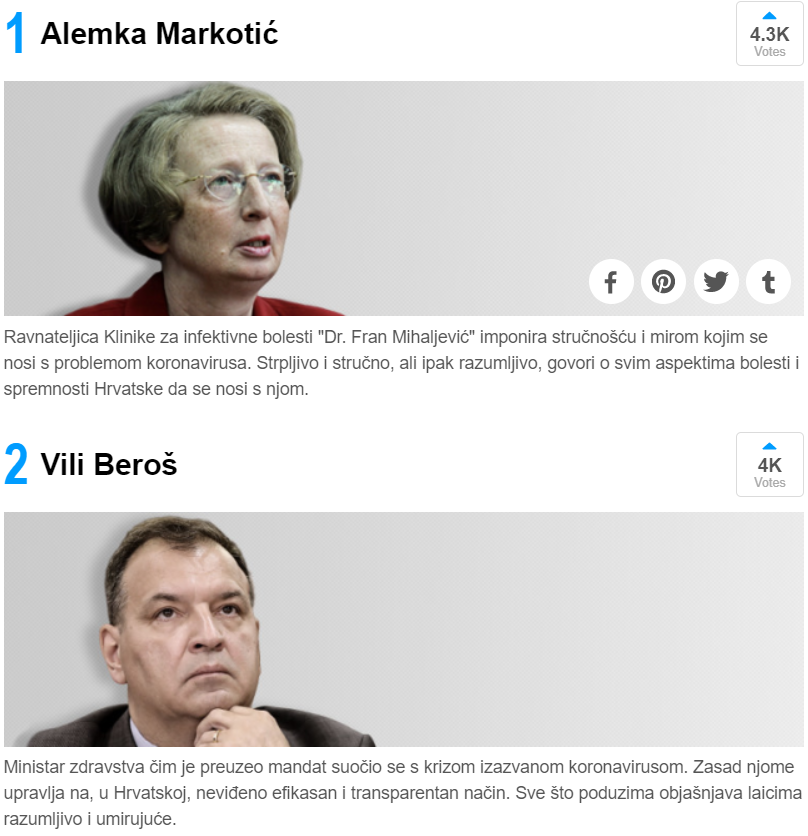
And now the latest excellent example of crisis communication, which has become a huge hit in just 12 hours since its launch, as we announced at 08:17 in our daily coronavirus/earthquake aftermath live update (which you can follow here):
"You can now follow the Civil Protection Headquarters announcement of the coronavirus on Viber. The headquarters say that this is the result of continuous efforts to prevent the spread of COVID-19 virus on the territory of the Republic of Croatia."
Just 10 hours later, there are already 325,000 people who are following the Viber account, Stozer. To put that number in perspective, the population of Croatia is about 4 million.
To join the rapidly expanding community to get access to the latest official updates for 'Stozer' on Viber, click here.
For more information on the coronavirus crisis in Croatia, follow the dedicated TCN section.
VIDEO: Croatia National Team Asks Croatian Citizens to Stay Home
March 23, 2020 - The Croatia national team members and coach Zlatko Dalic recorded a video with instructions on how Croatian citizens should behave during the coronavirus pandemic, with a final message that is as important as it is simple - stay home!
Captain Luka Modric, vice-captain Ivan Rakitic and the rest of the Croatia national team were supposed to travel to Doha today for a friendly tournament, but instead, they're spending time at home with their loved ones because of the coronavirus pandemic.
Considering the gravity of the situation, the 2018 World Cup finalists made a video, and in cooperation with the Croatian Institute of Public Health, sent instructions on how you should protect yourself during this pandemic. The video ends with a clear message, in the end, sent by the captain of the national team and the best player in the world in 2018, Luka Modric: "Stay home!"
HNS has already shown an understanding of the gravity of the situation by reacting early and postponing the Croatian football competitions. The Federation delegation led by president Davor Suker and coach Zlatko Dalic opted for voluntary self-isolation after attending the same event with the coronavirus-positive Serbian football federation president in Amsterdam.
The Croatian Football Federation calls on all citizens and organizations to take the maximum responsibility, seriousness and compliance with all measures prescribed by the competent state institutions in order to overcome this crisis together as soon as possible.
For live updates, follow our COVID-19 dedicated page.
Employers Call for Urgent Write-Off of Dues, Access to Money
ZAGREB, March 23, 2020 - The Croatian Employers Association (HUP) has called for a write-off of all dues and for access to liquid assets through various institutions for employers affected by the coronavirus crisis.
HUP director Davor Majetić said in a statement that in negotiations it had been conducting lately HUP wanted to achieve several goals.
The first goal is for all employers affected by movement restrictions to get nonrepayable grants for the payment of wages and for their operations.
HUP wants government bodies at all levels not to send them any bills and to write off all employers' dues (non-tax levies, concessions, membership fees, and public utility charges) for the duration of the crisis.
It calls for the suspension of all other taxes and concession fees rather than their postponement for the duration of the crisis, a lower profit tax rate and the postponement of the payment of profit income advances as well as the cancellation of the obligation to issue salary statements for directors.
HUP also demands loan rescheduling and refinancing, ensuring the international flow of goods, declaring a force majeure and postponing deadlines for the submission of reports, forms and statements of accounts due to difficulties caused by the pandemic.
More coronavirus news can be found in the Lifestyle section.
“We Are Heading Toward Tighter Restrictions on Movement”
ZAGREB, March 23, 2020 - We are heading toward tighter restrictions on movement, Interior Minister and head of the National Civil Protection Authority Davor Božinović said on Monday after a meeting of senior state officials.
"We are heading toward stricter restrictions on movement, in that only those people that need to go to work will be able to move around so that life does not come to a complete stop. That does not mean all services but those that are essential and whose movement is absolutely necessary," Božinović said.
He said that after the earthquakes that struck Zagreb on Sunday, more than 90 people have been accommodated in the Cvjetno Naselje student dorm, adding that there will be more people requiring require emergency accommodation. "It is essential that no one returns where it is not safe," he said.
Božinović underlined that earthquakes "have their own logic of behaviour," calling on citizens to focus on the coronavirus. "That's our main enemy. Please respect all decisions by the Civil Protection Authority," he stressed.
More coronavirus news can be found in the Lifestyle section.

